Can Menopause Cause Insomnia?
3 minute read
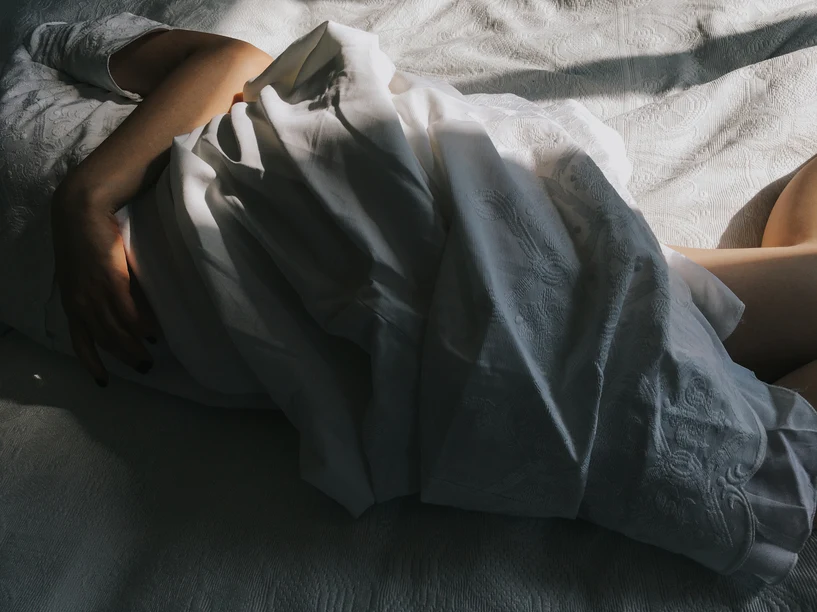
It’s a story as old as time. As in, once upon a time, you slept pretty well. Then menopause and poor sleep hit. Those nights of blissful, uninterrupted sleep took a hike.
If you’re experiencing menopause and sleep issues, you’re in the majority: Insomnia happens to be one of the most reported symptoms by menopausal women, say many studies, including this one.
Explaining Menopause and Poor Sleep
You probably already know that throughout the menopausal transition, which begins way before you stop your menstrual cycle— usually sometime in your 40s, or in some cases mid-30s — your hormones take a nosedive. It’s likely you’ll have trouble sleeping around this time, too.
Perimenopause, whose literal meaning is “around menopause,” marks the march toward menopause, when you are officially without a period for 12 consecutive months. And it’s during this time that estrogen begins to fluctuate unevenly. Also of note, these top menopause symptoms: hot flashes, vaginal dryness, depression and yes, the nightmare of insomnia.
During perimenopause, some months you’ll get a period and some months you won’t; other times your flow is lighter than normal or so heavy you’re afraid to leave the house. (You’ve likely packed away those white pants for a while.) And for many, there will be months where you miss a period completely.
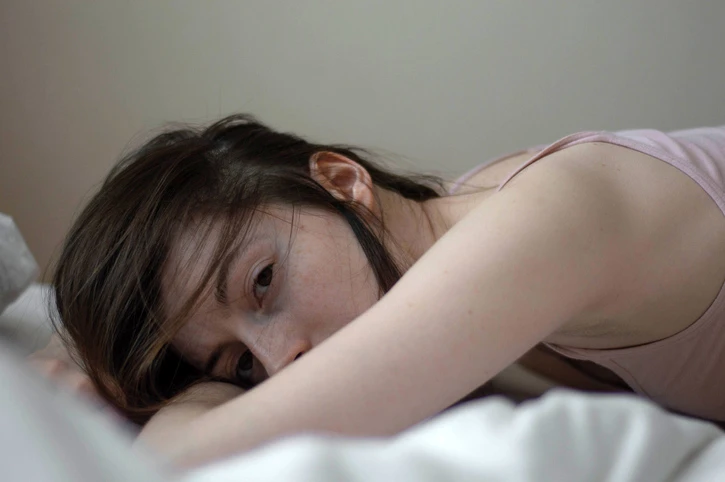
Besides missing a period or two, you’ll likely miss a lot of sleep. It turns out that the reasons you’re having sleep difficulty during menopause are as varied as your menstrual cycles. But first, let’s decode insomnia before we reveal the reasons for menopause and poor sleep.
What is Insomnia?
Insomnia is a common sleep disorder. Not only does it mean you have trouble falling asleep, but its symptoms also include:
· Trouble staying asleep
· Inability to get back to sleep
· Waking up too early
· Not feeling refreshed upon waking
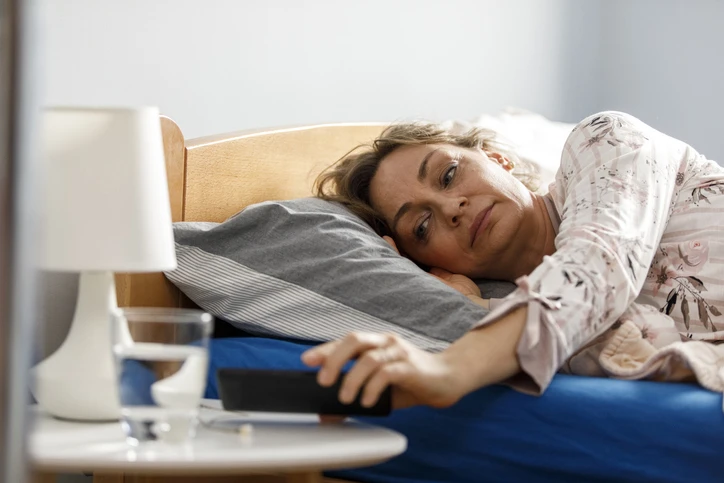
· Decreased quality of sleep
· Daytime fatigue or sleepiness
· Depression, irritability, anxiety
· Difficulty with memory
· Trouble focusing or paying attention
· Increased tendency for accidents or mistakes
So, why do menopause and poor sleep go together? The most obvious culprit is hormones, both decreases in estrogen and progesterone, (the latter having sedative qualities). Add to that:
· Vasomotor symptoms. This refers to hot flashes and night sweats. Studies show that all that sweating and subsequent perspiration (or often times downright dripping) wake the brain during sleep, translating into one of the most common causes of sleep disturbances and decrease in sleep quality).
· Depression & Anxiety. Raise your hand if your brain is not on an endless reel of thoughts that keeps you from sleeping. (Few hands noted.) And chances are, at the same time, you’ll have a lot of other non-menopause things running through your head; not only because of dipping hormone levels but also because of changes in life in general (like aging parents, growing children, job stress, financial concerns, divorce, death... the list goes on and on.)
· Obstructive Sleep Apnea (OSA). This condition, characterized by irregular breathing episodes during the night and usually accompanied by snoring, is more prevalent around menopause. Some experts believe it happens because we lose the protective effects of estrogen and progesterone. These sleep episodes cause frequent waking (up to 20 to 30 times a night) as your body struggles to regain regular breathing. (Make sure to get checked by your doc if you suspect you might have OSA, as it can lead to cardiovascular and other health problems if untreated.)
· Frequent Bathroom Trips. Pee much? Thought so. That’s especially a possibility due to a lack of estrogen, which can cause bladder dysfunction and make you urinate more often than usual (typically at the most inconvenient times, like at night, which is known as a condition called nocturia, or waking to urinate).
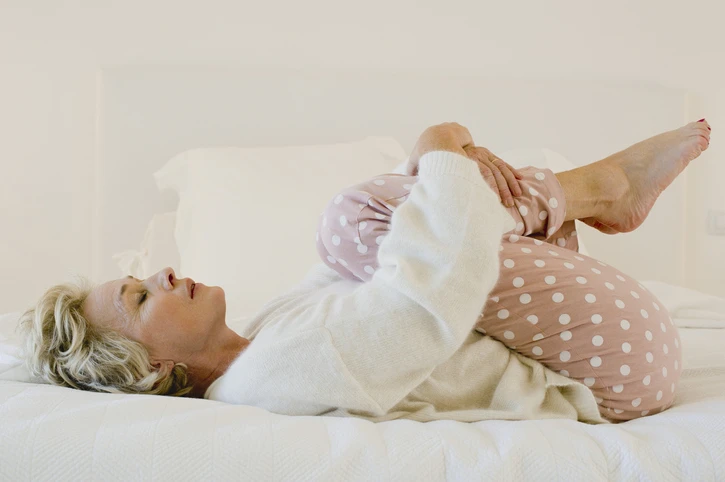
· Restless Legs Syndrome (RLS). Dancing in your sleep? Not exactly. But this condition makes you want to move your legs as if you were. It’s uncomfortable and can keep you awake. Some experts insist it’s not directly associated with menopause, but yet it does increase around the time of menopause; others see it a bit differently, stating that it affects more women who have vasomotor symptoms. Any way you slice it, active legs, if nothing else, make it super tough to get to sleep.
How to Have a Sleep Fest Despite Menopause
If your menopause is causing insomnia, you don’t have to give up on sleeping and accept the next-day fatigue. It turns out that there are ways to tweak your habits or adopt new ones to get the sleep hygiene you crave and need. (Remember, sleeping 7-9 hours a night is optimal for good physical and mental health.)
With a little know-how, you can map out a good night’s sleep despite menopause’s blueprint to ruin it. Here’s how:
· Eat Well. Researchers looking at the impact of food on insomnia and menopause have found that the risk of developing insomnia is higher in women with a higher-GI (glycemic index) diet and among those who eat more added sugars, including white and brown sugar, syrups, honey, and molasses. (The glycemic index is a measurement of how carbohydrates affect blood sugar; high-glycemic index food raise blood sugar quickly.) On the other hand, insomnia’s risk was lower among women who ate a diet rich in whole fruits and veggies. The glycemic index is a measurement of how carbohydrates affect blood sugar; high-glycemic index foods raise blood sugar quickly.
· Watch What You Drink. While alcohol does have a sedative effect, too much does the opposite, causing increased restlessness and wakefulness during the night. Generally, your sleep quality and quantity will suffer along with your next-day energy and concentration if you drink too much. Alcohol also increases the risk of sleep apnea.
The lesson here: Drink in moderation, and cap it at one drink.
· Keep the Temperature Low. Not only will a cool sleeping environment help your hot flashes, but it’s also associated with better, more restful sleep. That translates to about 65 degrees Fahrenheit, says the Sleep Foundation. They also say that because our bodies’ temperature naturally dips at night, lowering the thermostat can serve as a signal that it’s time for bed.
· Dress Lightly. It may seem obvious, but if you’re the type to wear flannel PJs to bed, chances are you’ll heat up too much during the night and your sleep cycle will suffer. If anything, switching out the pjs for ones in a light, sweat-wicking material like silk or bamboo, or consider wearing nothing at all.
· Consistency is Key. Stick to a sleep pattern where you go to bed and wake at the same time, including the weekends.
· Pay Attention to Your Environment. Keep your bedroom dark, quiet and cool. Ridding the room of clutter also helps create a calm, restful atmosphere.
· Nix the Electronics. Smartphones, computers, tablets, and TVs can all interfere with sleep. Some experts say the blue light emitted from them interferes with your circadian rhythm, while others insist that they overstimulate your brain, making it tough to settle down. Either way, put yours to sleep about an hour before you turn in.
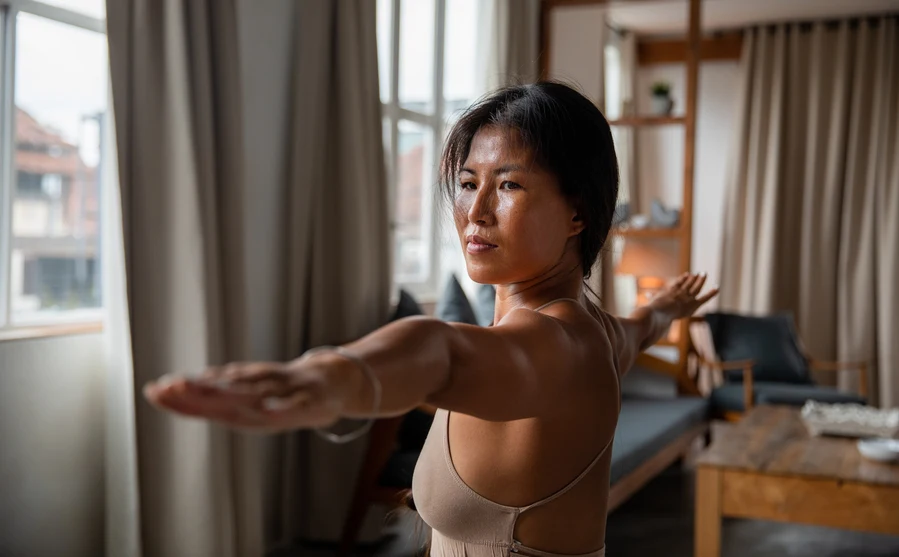
· Manage Your Stress. We hope you’re doing this all day, but in particular, nighttime is super-important to rid yourself of what ails you during the day; otherwise it may become an uninvited bedmate. Some proven stress-busters: deep breathing, stretching, meditation or yoga; a warm bath before bed or reading a relaxing book. And speaking of books, keep a journal at your bedside to dump-write all the stressful thoughts gathered from during the day.
As you can see, there are lots of tactics to try but if it’s time to get serious about your sleep, talk to your doctor. Need help finding one? Alloy can help.
Sources:
"Perimenopause". Mayo Clinic. https://www.mayoclinic.org/diseases-conditions/perimenopause/symptoms-causes/syc-20354666
"Insomnia". Mayo Clinic. https://www.mayoclinic.org/diseases-conditions/insomnia/symptoms-causes/syc-20355167
Gangwisch, James E et al. “High glycemic index and glycemic load diets as risk factors for insomnia: analyses from the Women's Health Initiative.” The American journal of clinical nutrition vol. 111,2 (2020): 429-439. doi:10.1093/ajcn/nqz275
Austin Meadows. "Insomnia". Sleep Foundation. Nov 29, 2021. https://www.sleepfoundation.org/insomnia
Danielle Pacheco. "Menopause and Sleep". Sleep Foundation. Jan 22, 2021. https://www.sleepfoundation.org/women-sleep/menopause-and-sleep
Eric Suni. "How Much Sleep Do We Really Need?". Sleep Foundation. Mar 10, 2021. https://www.sleepfoundation.org/how-sleep-works/how-much-sleep-do-we-really-need
Jennifer Chen. "Women, Are Your Hormones Keeping You Up at Night?". Yale Medicine. Jul 10, 2017. https://www.yalemedicine.org/news/women-are-your-hormones-keeping-you-up-at-night
Danielle Pacheco. "The Best Temperature for Sleep". Sleep Foundation. Updated Jun 24, 2021. https://www.sleepfoundation.org/bedroom-environment/best-temperature-for-sleep
" How Does Technology Affect Sleep?". Sleep.org. March 12, 2021. https://www.sleep.org/ways-technology-affects-sleep/
"How Does Menopause Affect My Sleep?". Johns Hopkins Health. https://www.hopkinsmedicine.org/health/wellness-and-prevention/how-does-menopause-affect-my-sleep
Ruchała, Marek et al. “Obstructive sleep apnea and hormones - a novel insight.” Archives of medical science: AMS vol. 13,4 (2017): 875-884. doi:10.5114/aoms.2016.61499
Jin, Jill. “Vaginal and Urinary Symptoms of Menopause.” JAMA vol. 317,13 (2017): 1388. doi:10.1001/jama.2017.0833
Lee, Jinju et al. “Sleep Disorders and Menopause.” Journal of menopausal medicine vol. 25,2 (2019): 83-87. doi:10.6118/jmm.19192
Wesstrom, J et al. “Restless legs syndrome among women: prevalence, co-morbidity and possible relationship to menopause.” Climacteric: the journal of the International Menopause Society vol. 11,5 (2008): 422-8. doi:10.1080/13697130802359683
Subscribe
Go ahead, you deserve to
feel fantastic
By subscribing you agree to our Terms of Service & Privacy Policy.